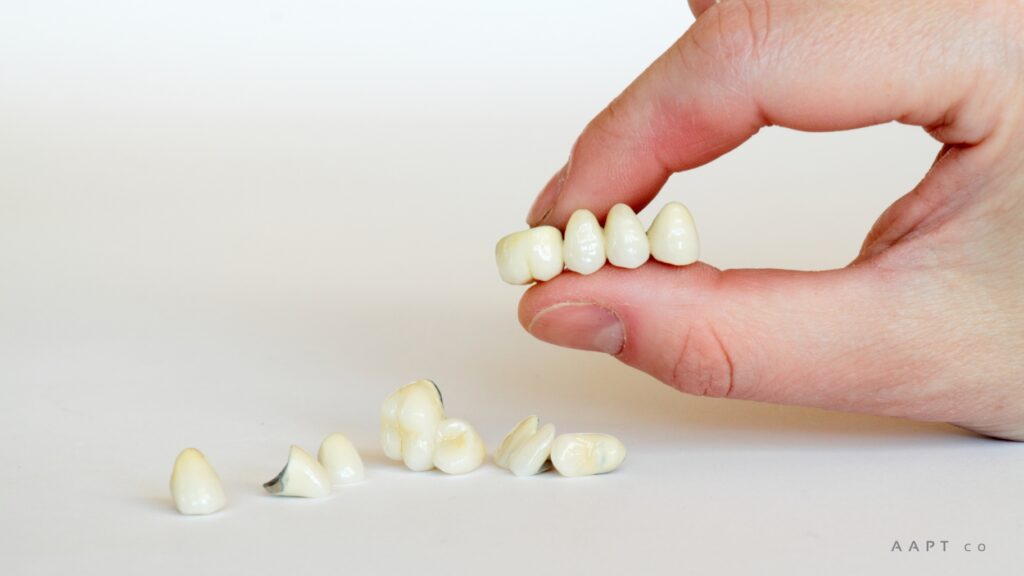Bridging the Gap: All About Dental Crown Bridges
This post was last updated on December 9th, 2024
When it comes to maintaining a healthy and confident smile, dental crown bridges play a crucial role. These remarkable dental devices have been changing lives for the better, helping people regain their dental health and self-esteem.
In this comprehensive guide, we will dive into the world of dental crown bridges, exploring what they are, how they work, and why they’re a popular choice for restoring smiles.

What Are Dental Crown Bridges?
Dental crown bridges, often simply referred to as crown bridges, are a fixed dental restoration used to replace missing teeth. They consist of one or more artificial teeth (pontics) that are held in place by crowns on either side. The crowns are typically anchored to the natural teeth or dental implants on each end, creating a bridge that fills the gap left by missing teeth.
Why Choose Dental Crown Bridges?
1. Restoring Functionality
One of the most significant advantages of dental crown bridges is their ability to restore the functionality of your teeth. Missing teeth can lead to difficulties in biting and chewing, impacting your overall oral health. Crown bridges effectively bridge the gap, allowing you to eat, speak, and smile with confidence.
2. Maintaining Oral Health
Besides functionality, crown bridges contribute to the maintenance of your oral health. When teeth are missing, adjacent teeth can shift out of place, leading to misalignment issues. This can result in improper bite alignment and potentially more dental problems down the road. Crown bridges prevent these shifts, preserving your overall dental health.
3. Aesthetics and Confidence
The appearance of your smile is undoubtedly crucial for your self-confidence. Dental crown bridges are designed to look natural, matching the color and shape of your existing teeth. With a beautiful, gap-free smile, you can regain your self-esteem and feel more comfortable in social and professional settings.
The Crown Bridge Procedure
If you’re considering getting a dental crown bridge, it’s essential to understand the process involved:
1. Consultation
Your journey starts with a consultation with your dentist. They will examine your oral health, discuss your specific needs and preferences, and determine if a crown bridge is the right solution for you.
2. Preparing the Abutment Teeth
The next step involves preparing the abutment teeth, which will support the crown bridge. Your dentist will reshape these teeth to make room for the crowns that will hold the bridge in place. If you have dental implants, this step may not be necessary.
3. Impressions
Your dentist will take impressions of your teeth to create a precise model for the bridge and pontics. These impressions will be sent to a dental laboratory for fabrication.
4. Temporary Bridge
While your permanent bridge is being crafted, your dentist will place a temporary bridge to protect your prepared teeth and ensure functionality.
5. Fitting the Permanent Bridge
Once the permanent crown bridge is ready, your dentist will remove the temporary bridge and fit the new one. They will check for proper fit and alignment, making any necessary adjustments.
6. Cementing the Bridge
When everything is perfect, your dentist will cement the bridge into place. This secures the pontics and crowns to your abutment teeth or implants.
Caring for Your Dental Crown Bridge
Maintaining your crown bridge Maintaining your crown bridge is essential for its longevity. Here are some tips to ensure your bridge stays in great condition:
- Oral Hygiene: Brush and floss your crown bridge as you would your natural teeth. Regular dental check-ups are essential to monitor your bridge’s health.
- Diet: While your crown bridge can withstand typical chewing and biting, avoid biting into exceptionally hard foods or using your teeth as tools.
- Avoid Chewing Ice: Chewing on ice can lead to damage, so it’s best to avoid this habit.
- Quit Smoking: Smoking can stain the bridge and affect its appearance, so consider quitting for the sake of your dental health.
Dental Crown Bridges vs. Other Options
While dental crown bridges are an excellent solution for many, it’s essential to be aware of other options and their pros and cons. Here’s a quick comparison:
Dental Crown Bridges vs. Dentures
- Crown Bridges: Provide a permanent, fixed solution that feels and looks like natural teeth.
- Dentures: Removable and may require adhesives, but are typically more affordable.
Dental Crown Bridges vs. Dental Implants
- Crown Bridges: Non-surgical, ideal for people with healthy adjacent teeth.
- Dental Implants: Surgical, replacing both the tooth and its root, offering a long-term solution.
The Cost of Dental Crown Bridges
The cost of a dental crown bridge can vary based on several factors, including the number of pontics and the materials used. It’s essential to discuss costs with your dentist and, if applicable, explore insurance or financing options.
In Conclusion
Dental crown bridges are a fantastic solution for restoring missing teeth, offering functionality, aesthetics, and improved oral health. If you’re considering this option, consult with your dentist to determine if it’s the right choice for you.
Remember, a healthy, confident smile is within reach with the help of dental crown bridges. Say goodbye to the gap and hello to a brighter, more confident you!
You may like this
Recommended For You
A Definitive Guide To Facet Joint Syndrome
Most Inside
Most Inside offers high-quality recommendations and valuable updates to enhance all aspects of your life, providing premium guidance and enriching experiences.




